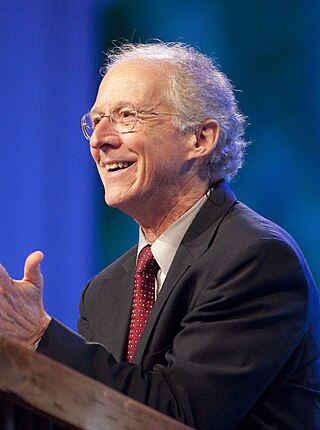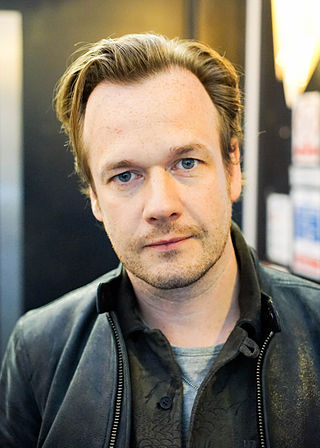Related Research Articles
Evangelicalism, also called evangelical Christianity or evangelical Protestantism, is a worldwide interdenominational movement within Protestant Christianity that emphasizes the centrality of sharing the "good news" of Christianity, being "born again" in which an individual experiences personal conversion, as authoritatively guided by the Bible, God's revelation to humanity. The word evangelical comes from the Greek word for 'good news'.

John Stephen Piper is an American Baptist theologian, pastor, and chancellor of Bethlehem College and Seminary in Minneapolis, Minnesota. Piper taught biblical studies at Bethel University for six years (1974–1980), before serving as pastor for preaching and vision of Bethlehem Baptist Church (Converge) in Minneapolis for 33 years (1980–2013).
The emerging church, sometimes wrongly equated with the "emergent movement" or "emergent conversation", is a Christian movement of the late 20th and early 21st century. Emerging churches can be found around the globe, predominantly in North America, Western Europe, Australia, New Zealand, and Africa. Members come from a number of Christian traditions. Some attend local independent churches or house churches while others worship in traditional Christian denominations. The emerging church favors the use of simple story and narrative. Members of the movement often place a high value on good works or social activism, including missional living. Proponents of the movement believe it transcends labels such as "conservative" and "liberal"; it is sometimes called a "conversation" to emphasize its developing and decentralized nature, its range of standpoints, and commitment to dialogue. Participants seek to live their faith in what they believe to be a "postmodern" society. Disillusionment with the organized and institutional church has led participants to support the deconstruction of modern Christian worship and evangelism, and the nature of modern Christian community.
John David Caputo is an American philosopher who is the Thomas J. Watson Professor of Religion Emeritus at Syracuse University and the David R. Cook Professor of Philosophy Emeritus at Villanova University. Caputo is a major figure associated with postmodern Christianity and continental philosophy of religion, as well as the founder of the theological movement known as weak theology. Much of Caputo's work focuses on hermeneutics, phenomenology, deconstruction, and theology.
Progressive Christianity represents a postmodern theological approach, which developed out of the liberal Christianity of the modern era, itself rooted in the Enlightenment's thinking. Progressive Christianity is a postliberal theological movement within Christianity that, in the words of Reverend Roger Wolsey, "seeks to reform the faith via the insights of post-modernism and a reclaiming of the truth beyond the verifiable historicity and factuality of the passages in the Bible by affirming the truths within the stories that may not have actually happened."
Postmodern theology, also known as the continental philosophy of religion, is a philosophical and theological movement that interprets Christian theology in light of post-Heideggerian continental philosophy, including phenomenology, post-structuralism, and deconstruction.
Paleo-orthodoxy is a Protestant Christian theological movement in the United States which emerged in the late 20th and early 21st centuries and which focuses on the consensual understanding of the faith among the ecumenical councils and Church Fathers. While it understands this consensus of the Church Fathers as orthodoxy proper, it calls itself paleo-orthodoxy to distinguish itself from neo-orthodoxy, a movement that was influential among Protestant churches in the mid-20th century.

Brian D. McLaren is an author, speaker, activist, public theologian and was a leading figure in the emerging church movement. McLaren is often associated with postmodern Christianity.
Conservative Christianity, also known as conservative theology, theological conservatism, traditional Christianity, or biblical orthodoxy is a grouping of overlapping and denominationally diverse theological movements within Christianity that seeks to retain the orthodox and long-standing traditions and beliefs of Christianity. It is contrasted with Liberal Christianity and Progressive Christianity, which are seen as heretical heterodoxies by theological conservatives. Conservative Christianity should not be mistaken as being necessarily synonymous with the political philosophy of conservatism, nor the Christian right.
Kevin Jon Vanhoozer is an American theologian and current research professor of Systematic Theology at Trinity Evangelical Divinity School (TEDS) in Deerfield, Illinois. Much of Vanhoozer's work focuses on systematic theology, hermeneutics, and postmodernism.

Peter Rollins is a Northern Irish writer, public speaker, philosopher, producer and theologian.

James Kenneth Alexander Smith is a Canadian-American philosopher who is currently Professor of Philosophy at Calvin University, holding the Gary & Henrietta Byker Chair in Applied Reformed Theology & Worldview. He is the current editor-in-chief of the literary journal Image.

John Landrum Cooper is an American musician. He has been the lead vocalist, bassist and co-founder of Christian rock band Skillet since 1996 and the only constant member of his side project Fight the Fury since 2018.
Roberto Rino Magliola is an Italian-American academic specializing in European hermeneutics and deconstruction, comparative philosophy, and inter-religious dialogue. He is retired from the National Taiwan University and Assumption University of Thailand.
Positive deconstruction, in relation to Christian apologetics, is a term first used by Nick Pollard in Evangelism Made Slightly Less Difficult, to describe a methodology for engaging with worldviews in Christian apologetics. The process is one of deconstruction because it involves 'dismantling' the worldview in order to identify areas of conflict with a Christian worldview. It is positive because the intention is not to destroy a person's ideas and belief system, but to build on areas of agreement between the two worldviews in order to argue for the truth of the Christian worldview.
New Calvinism, also known as the Young, Restless, and Reformed Movement, is a movement within conservative Evangelicalism that reinterprets 16th century Calvinism under contemporary US values and ideologies.
The following is a bibliography of John D. Caputo's works. Caputo is an American philosopher closely associated with postmodern Christianity.
Exvangelical is a social movement of people who have left evangelicalism, especially white evangelical churches in the United States, for atheism, agnosticism, progressive Christianity, or any other religious belief, or lack thereof. People in the movement are called "exvangelicals" or "exvies". The term prodigals is sometimes used for exvangelicals by people who remain evangelical.
NakedPastor is the brand name of author and cartoonist David Hayward. Hayward started a blog called nakedpastor in 2006 and initiated his public analysis of religion, religious communities, and spirituality through his writings, art, and cartoons. Hayward was one of the first people to start using the word deconstruction in relation to faith. His work includes topics such as spiritual abuse, faith deconstruction, exvangelicals, Women’s rights, and LGBTQ+ rights.
References
- ↑ Schaal, Kevin (5 December 2021). "Evangelical Deconstruction: Biblical Fundamentalist Thoughts". Foundations Baptist Fellowship International . Retrieved 20 June 2022.
- ↑ Szterszky, Subby. "Deconstruction: A look at a popular and polarizing concept". Focus on the Family Canada . Retrieved 20 June 2022.
- 1 2 Childers, Alisa (18 February 2022). "Why We Should Not Redeem 'Deconstruction'". The Gospel Coalition . Retrieved 20 June 2022.
- 1 2 3 4 5 Huckabee, Tyler (9 February 2022). "Skillet's John Cooper: It's Time to 'Declare War Against This Deconstruction Christian Movement'". Relevant . Retrieved 20 June 2022.
- ↑ Stonestreet, John; Padgett, Timothy D. "The Problem with Deconstructing Faith". BreakPoint. Colson Center . Retrieved 20 June 2022.
- 1 2 Jackson, Jesse T. (8 December 2021). "Matt Chandler Responds to Deconstruction Controversy". ChurchLeaders. Retrieved 20 June 2022.
- ↑ Garrison, Becky (September 9, 2020). "Doubt, Marriage, and the NakedPastor". TheHumanist.com.
- ↑ Rhett's Spiritual Deconstruction , retrieved 2022-11-30
- ↑ Link's Spiritual Deconstruction , retrieved 2022-11-30
- ↑ Austin, Terry (22 November 2021). "Jesus and deconstruction". Baptist News Global . Retrieved 20 June 2022.
- ↑ Mayberry, Carly (13 August 2021). "Josh Harris Launches Course on Deconstructing Faith, but Some Theologians Question His Motives". Newsweek . Retrieved 20 June 2022.
- ↑ Gryboski, Michael (13 August 2021). "'I kissed dating goodbye' author Josh Harris offering 'deconstruction' class on Christianity for $275". The Christian Post . Retrieved 20 June 2022.
- ↑ Lea, Jessica (16 August 2021). "UPDATE: After 'Valid Criticism,' Josh Harris Takes Down His Deconstruction Course". ChurchLeaders. Retrieved 20 June 2022.
- ↑ Poletti, Johnathan (16 April 2021). "Abraham Piper deconstructs his dad". Medium . Retrieved 20 June 2022.
- ↑ Jackson, Jesse T. (14 April 2021). "Not Desiring God–John Piper's Son Criticizes His Upbringing to 925k TikTok Followers". ChurchLeaders. Retrieved 20 June 2022.
- ↑ Kuruvilla, Carol (26 August 2019). "Evangelical Songwriter Says He's No Longer Christian In Emotional Instagram Post". HuffPost . Retrieved 20 June 2022.
- ↑ "Skillet's John Cooper Warns 'Young People' of 'False Religion' in Viral TikTok". Movieguide. 11 February 2022. Retrieved 20 June 2022.
- ↑ Trueman, Carl (12 August 2021). "Josh Harris's Message Remains the Same". First Things . Retrieved 20 June 2022.